Zoom
Trash

Tips for Teachers: Successful strategies for teaching gifted learners. Davidson Institute for Talent Development 2003 This article by the Davidson Institute for Talent Development offers a list of tips for teachers.
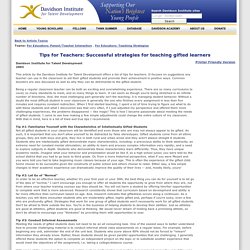
It focuses on suggestions any teacher can use in the classroom to aid their gifted students and promote their achievement in positive ways. Common blunders are also discussed as well as why they can be detrimental to the gifted student. Being a regular classroom teacher can be both an exciting and overwhelming experience. There are so many curriculums to cover, so many standards to meet, and so many things to learn. Tip #1: Familiarize Yourself with the Characteristics of Intellectually Gifted StudentsNot all gifted students in your classroom will be identified and even those who are may not always appear to be gifted. Tip #2: Let Go of "Normal"In order to be an effective teacher, whether it's your first year or your 30th, the best thing you can do for yourself is to let go of the idea of "normal. " Permission Statement Comments.
Meeting the Needs of Gifted Students: Differentiating Mathematics and Science Instruction. Serving Gifted Students in General Ed Classrooms. Gifted students who are served in general education classrooms frequently finish their work sooner than other students.
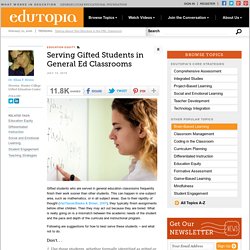
This can happen in one subject area, such as mathematics, or in all subject areas. Due to their rapidity of thought (VanTassel-Baska & Brown, 2007), they typically finish assignments before other children. Then they may act out because they are bored. What is really going on is a mismatch between the academic needs of the student and the pace and depth of the curricula and instructional program. Following are suggestions for how to best serve these students -- and what not to do. Don't. . . Table of Developmental Milestones Contrasting Normal Children With Gifted Children at 30% Advancement. 10 Social & Emotional Needs of the Gifted. Gifted Girls to Gifted Women Lori(2) Twice Exceptional Children (2e) Federal Definition of "Giftedness" The US government defines "Gifted & Talented" students as those...
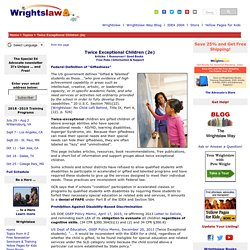
"who give evidence of high achievement capability in areas such as intellectual, creative, artistic, or leadership capacity, or in specific academic fields, and who need services or activities not ordinarily provided by the school in order to fully develop those capabilities. " 20 U.S.C. Section 7801(22). (Wrightslaw: No Child Left Behind, Title IX, Part A, (22). p. 526) Twice-exceptional children are gifted children of above average abilities who have special educational needs - AD/HD, learning disabilities, Asperger Syndrome, etc. This page includes articles, resources, book recommendations, free publications, and a short list of information and support groups about twice exceptional children.
Prohibition Against Disability-Based Discrimination. Uniquely Gifted - Resources for Gifted/Special Needs Children. Free Gifted Resources and Curriculum. The Best Gifted Resources and Curriculum We’ve Found: Mostly Free! Free Gifted Education Resources: Teaching Philosophy to Children: Lesson plans for all ages from the University of Washington Center for Philosophy for Children. The Marshmallow Challenge: Fun creative team building exercise for students. Myths and Legends: This is a really cool site where kids can create myths and legends, cartoon style. Good graphics and easy to use. TED: Riveting talks by remarkable people, free to the world: From the podcast publisher: “Each year, TED hosts 80 of the world’s most fascinating people: Trusted voices and convention-breaking mavericks, icons and geniuses.
And “ If you’re a teacher, consider incorporating TEDTalks into your courses. Working with Gifted & Talented Students - TeachersFirst. Working with a gifted student can be both a joy and a frustration.
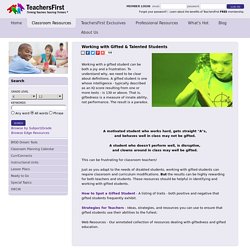
To understand why, we need to be clear about definitions. A gifted student is one whose intelligence - typically described as an IQ score resulting from one or more tests - is 130 or above. That is, giftedness is a measure of innate ability, not performance. The result is a paradox. A motivated student who works hard, gets straight "A"s, and behaves well in class may not be gifted. A student who doesn't perform well, is disruptive, and clowns around in class may well be gifted. This can be frustrating for classroom teachers! Gifted Educational Resources for Families, Educators and Students. Evidence-Based Practices in Teaching Gifted and Exceptional Students. NSGT - Differentiating Learning for Gifted Students.
The Puzzle of Differentiating Learning for Gifted Students by Barbara Swicord, Ed.D.
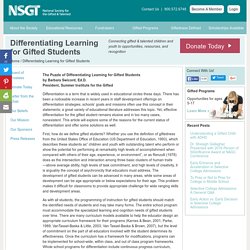
President, Summer Institute for the Gifted Differentiation is a term that is widely used in educational circles these days. There has been a noticeable increase in recent years in staff development offerings on differentiation strategies; schools’ goals and missions often use this concept in their statements; a great variety of educational literature addresses this topic. Yet, effective differentiation for the gifted student remains elusive and in too many cases, nonexistent. This article will explore some of the reasons for the current status of differentiation and offer some solutions as well.
Read About Best Practices in Supporting Gifted and Talented Students - Benchmark Education Storefront. Characteristics of Gifted Learners Giftedness vs.
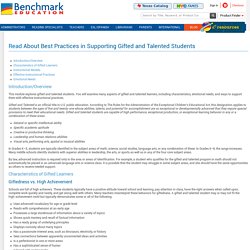
High Achievement Schools are full of high achievers. These students typically have a positive attitude toward school and learning, pay attention in class, have the right answers when called upon, complete work quickly and neatly, and get along well with others. Many teachers misinterpret these behaviors for giftedness. The following chart, adapted from Challenge, Modern Curriculum Press (1989), further explores the difference between a “bright child” and a gifted learner: National Association for Gifted Children. Separate studies conducted during the last few decades have demonstrated both the need for and the benefits of gifted education programs.
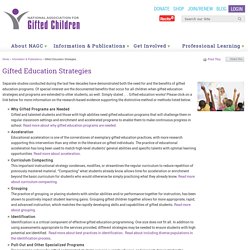
Of special interest are the documented benefits that occur for all children when gifted education strategies and programs are extended to other students, as well. Simply stated . . . Gifted education works! Please click on a link below for more information on the research-based evidence supporting the distinctive method or methods listed below. Gifted programming for poor or minority urban students: Issues and lessons learned. Twice Exceptional Children (2e) Uniquely Gifted - Resources for Gifted/Special Needs Children. The Cluster Model in Gifted Education.